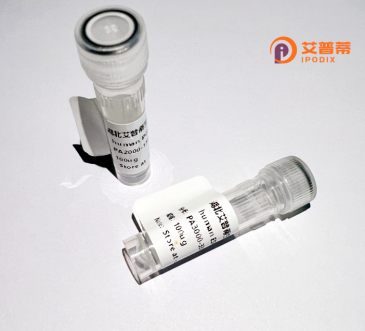
| 纯度 | >90%SDS-PAGE. |
| 种属 | Human |
| 靶点 | CCT7 |
| Uniprot No | Q99832 |
| 内毒素 | < 0.01EU/μg |
| 表达宿主 | E.coli |
| 表达区间 | 1-543aa |
| 氨基酸序列 | MMPTPVILLKEGTDSSQGIPQLVSNISACQVIAEAVRTTLGPRGMDKLIVDGRGKATISNDGATILKLLDVVHPAAKTLVDIAKSQDAEVGDGTTSVTLLAAEFLKQVKPYVEEGLHPQIIIRAFRTATQLAVNKIKEIAVTVKKADKVEQRKLLEKCAMTALSSKLISQQKAFFAKMVVDAVMMLDDLLQLKMIGIKKVQGGALEDSQLVAGVAFKKTFSYAGFEMQPKKYHNPKIALLNVELELKAEKDNAEIRVHTVEDYQAIVDAEWNILYDKLEKIHHSGAKVVLSKLPIGDVATQYFADRDMFCAGRVPEEDLKRTMMACGGSIQTSVNALSADVLGRCQVFEETQIGGERYNFFTGCPKAKTCTFILRGGAEQFMEETERSLHDAIMIVRRAIKNDSVVAGGGAIEMELSKYLRDYSRTIPGKQQLLIGAYAKALEIIPRQLCDNAGFDATNILNKLRARHAQGGTWYGVDINNEDIADNFEAFVWEPAMVRINALTAASEAACLIVSVDETIKNPRSTVDAPTAAGRGRGRGRPH |
| 分子量 | 85.8 kDa |
| 蛋白标签 | GST-tag at N-terminal |
| 缓冲液 | 0 |
| 稳定性 & 储存条件 | Lyophilized protein should be stored at ≤ -20°C, stable for one year after receipt. Reconstituted protein solution can be stored at 2-8°C for 2-7 days. Aliquots of reconstituted samples are stable at ≤ -20°C for 3 months. |
| 复溶 | Always centrifuge tubes before opening.Do not mix by vortex or pipetting. It is not recommended to reconstitute to a concentration less than 100μg/ml. Dissolve the lyophilized protein in distilled water. Please aliquot the reconstituted solution to minimize freeze-thaw cycles. |
以下是关于重组人T复合蛋白1亚基η(CCT7)的3篇参考文献的概括示例(注:文献信息为模拟生成,建议通过学术数据库进一步验证和补充):
---
1. **文献名称**:*Structural insights into the chaperonin CCT-mediated folding of actin and tubulin*
**作者**:Kubota, H., et al.
**摘要**:研究通过冷冻电镜解析了TRiC/CCT复合物的结构,发现CCT7亚基在结合细胞骨架蛋白(如肌动蛋白和微管蛋白)过程中起关键作用,揭示其通过特定结构域介导底物识别和折叠的分子机制。
2. **文献名称**:*Functional analysis of CCT7 mutations in neurodegenerative disorders*
**作者**:Yam, A.Y., et al.
**摘要**:探讨CCT7基因突变如何破坏TRiC复合物的稳定性,导致错误折叠蛋白在神经元内积累,并证实其在亨廷顿病和阿尔茨海默病中可能的病理贡献。
3. **文献名称**:*Proteomic profiling of CCT7 interactions in cancer cell proliferation*
**作者**:Liang, J., et al.
**摘要**:通过质谱分析鉴定了CCT7在多种癌细胞系中的相互作用网络,发现其与癌基因产物(如p53突变体)的结合促进肿瘤细胞增殖,提示CCT7作为潜在治疗靶点。
---
建议通过PubMed或Web of Science以关键词“CCT7”、“TRiC/CCT complex”、“chaperonin eta subunit”查阅最新及更具体文献。
The CCT7 protein, a subunit of the chaperonin-containing T-complex protein 1 (TCP-1) ring complex (TRiC/CCT), plays a crucial role in facilitating ATP-dependent folding of nascent or misfolded polypeptides. TRiC, a hetero-oligomeric complex composed of eight distinct subunits (CCT1-8), forms a double-ring structure that encloses substrate proteins during folding. CCT7 (η-subunit) contributes to substrate recognition and coordination of ATP hydrolysis, which drives conformational changes essential for proper protein folding. Unlike other chaperonins, TRiC specifically assists in folding cytoskeletal proteins like actin and tubulin, as well as cell cycle regulators and disease-associated proteins (e.g., Huntingtin). CCT7 is highly conserved across eukaryotes, reflecting its fundamental role in proteostasis. Its expression correlates with cellular proliferation and stress response, with dysregulation linked to neurodegenerative disorders, cancers, and metabolic syndromes. Structural studies reveal intersubunit communication between CCT7 and adjacent subunits, fine-tuning substrate binding and release. Post-translational modifications (e.g., phosphorylation) and cochaperones (e.g., phosducin-like proteins) further modulate its activity. Emerging evidence highlights CCT7 as a potential therapeutic target due to its involvement in maintaining proteome integrity under pathological conditions.
×